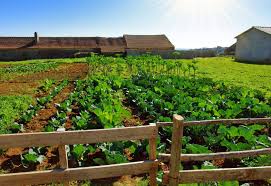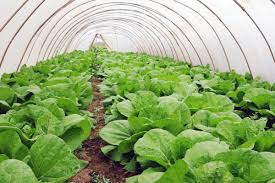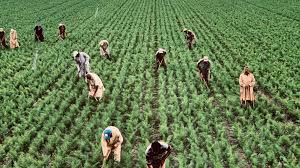Organic farming systems depend on crop rotation, green manures, legumes, animal manures, crop residues, off-farming natural wastes, and biological pest control methods to maintain soil fertility and productivity, sustain crops, and reduce pests, diseases, and unwanted weeds.
This production system preserves the quality of the soil ecosystem and promotes human health. The introduction of chemicals in conventional farming initially resulted in increased crop yields and healthy soils, with pests not yet resistant to chemicals, and the damage from chemical fertilizers was barely noticeable.
This technology quickly spread worldwide, seen as a revolution in agriculture.
Currently, organic farming is gaining renewed attention after the realization that conventional farming methods cause many problems, including health issues like cancer, pollution, soil and water degradation, and negative effects on domestic animals.
Organic agriculture offers a viable alternative to these challenges and problems associated with conventional farming.
Read Also: Major Genetic Differences between Tropical and Temperate Livestock Breeds
Benefits of Organic Agriculture on Health and Environment

Organic agriculture offers multiple benefits: it prevents environmental degradation; produces nutritionally superior crops; creates optimal soil conditions for high yields through organic manure; reduces pollution by recycling domestic and farm wastes into fertilizer; and improves living conditions for humans.
Additionally, organic foods undergo rigorous quality checks and certification processes, ensuring authenticity and trustworthy labeling.
1. Health Benefits of Organic Farm Produce
Organic farm produce provides significant health advantages as they: enhance soil, plant, animal, and human nutrition; contain no harmful chemicals; offer better taste, affordability, and longer shelf life; protect the environment; and undergo strict quality verification. The health benefits of organic farm produce include:
1. Better nutrition: Compared to conventionally grown foods, organic foods are richer in nutrients, determined by their mineral and vitamin content. Organic farming improves soil nutrients, which are passed on to plants and animals.
2. Health protection: Organic foods are free from chemical residues since organic farmers avoid chemicals at all stages of food production. Natural farming techniques used do not harm humans or the environment, helping to prevent diseases such as cancer and diabetes.
3. Free of poisons: Organic farming excludes poisonous chemicals, pesticides, and weedicides. Studies show that exposure to toxic substances in conventional agriculture has contributed to diseases like cancer. Avoidance of these toxins in organic farming reduces health risks.
4. Lower prices: Contrary to the misconception that organic foods are expensive, they are often cheaper due to the absence of costly chemical pesticides, insecticides, and weedicides. Organic foods can be sourced directly from producers at reasonable prices.
5. Enhanced taste: Organic foods tend to taste better because of higher natural sugar content in fruits and vegetables. Quality can be measured using Brix analysis.
6. Longer shelf life: Organic plants have stronger metabolic and structural integrity in their cellular makeup compared to conventional crops, allowing longer storage without spoilage. Organic farming also controls pests and weeds non-toxically, reduces cultivation input costs, preserves ecological balance, and promotes biodiversity.
2. Environmental Benefits of Organic Farming Methods
In conventional farms, chemicals often contaminate soil and nearby water sources, harming plants, animals, and humans. Organic farming avoids these harsh chemicals, protecting the environment.
Organic foods undergo strict authentication through quality checks and investigations, ensuring genuine organic products in the market. This process protects consumers from counterfeit products falsely labeled as organic.
Read Also: Crossbreeding as Tool for Tropical Livestock Improvement
3. Benefits of Organic Agriculture for Agro-Ecosystems and Environment

Organic farming enhances agro-ecosystem health, including biodiversity, natural cycles, and soil biological activity. Although it represents only about 2% of global food sales, organic agriculture is growing in importance worldwide.
Despite limited official data due to confidentiality, organic agriculture offers the following benefits:
i. Prevention of environmental degradation by avoiding chemical sprays and dust.
ii. Production of healthier and more nutritious crops for humans and animals.
iii. Use of organic fertilizers that restore soil pH affected by chemical fertilizers.
iv. Use of organic manure to optimize soil conditions for high yields and quality.
v. Pollution reduction by recycling wastes that would otherwise contaminate.
vi. Creation of employment opportunities in rural areas through labor-intensive organic farming.
vii. Overall provision of a balanced environment, better products, and improved living conditions for people.
4. Soil Management and Environmental Advantages in Organic Farming
Organic farming employs soil management practices such as crop rotation, organic fertilizers, symbiotic plant associations, cover crops, intercropping, and minimal tillage.
These improve soil nutrient and water retention, enhance nutrient cycling, and stabilize soil structure through soil fauna and vegetation.
The significant environmental benefits include:
i. Reduced pollution from fewer chemical inputs, less soil erosion, water conservation, improved soil organic matter, and greater biodiversity compared to conventional systems.
ii. Cleaner atmosphere due to the absence of harmful pesticide and fertilizer sprays.
iii. Lower energy use because organic farming uses composted manure and cover crops to enrich soil nitrogen, avoiding the high-energy input of synthetic nitrogen fertilizers and repeated chemical applications.
5. Unsustainability of Conventional Farming Practices and Differences From Organic Farming
Conventional farming practices are unsustainable due to:
i. Loss of soil fertility caused by excessive chemical fertilizer use and lack of crop rotation.
ii. Nitrate runoff contaminating water sources during rains.
iii. Soil erosion from deep ploughing and heavy rainfall.
iv. High fuel consumption for cultivation.
v. Use of toxic biocide sprays against pests and weeds.
vi. Animal welfare concerns in housing, feeding, breeding, and slaughtering.
vii. Loss of biodiversity due to monoculture.
viii. Displacement of native animals and plants by exotic species and hybrids.
Differences between organic and conventional farming methods are summarized as follows:
Conventional Farming MethodsOrganic Farming MethodsSeeds are fumigated with harsh chemicals before plantingSeeds are not treated with chemicals before sowingSoil fertilized with petroleum-based fertilizers after land preparationSoil enriched with natural-based fertilizers such as manure, bone meal, or shellfish fertilizerSeeds soaked in chemical fungicides and pesticides, and irrigation water treated chemicallySeeds are not soaked in chemicals; irrigation depends on natural rain or stored rainwaterWeeds controlled using chemical weedicidesWeeds removed manually, with flame weeding or grazing animalsMonocropping practice destroys soil fertilityMultiple cropping enhances biodiversity, productivity, and system resilience
This article highlights that organic farming employs natural techniques that protect human health and the environment. It improves agro-ecosystem health, biodiversity, and soil biological activity.
Organic farming is preferred over conventional farming because it controls pests and weeds non-toxically, reduces cultivation costs, preserves ecological balance, and promotes biodiversity.
Organic farming methods avoid harsh chemicals that contaminate soil and water sources, helping to maintain health and prevent diseases such as cancer and diabetes.
The benefits include preventing environmental degradation, producing nutritionally superior crops, creating optimal soil conditions with organic manure, reducing pollution by recycling wastes, and improving human living conditions.
Organic produce is free of poisons and has longer shelf life due to superior cellular integrity. These advantages demonstrate why organic agriculture continues to grow as a sustainable alternative to conventional farming.
Do you have any questions, suggestions, or contributions? If so, please feel free to use the comment box below to share your thoughts. We also encourage you to kindly share this information with others who might benefit from it. Since we can’t reach everyone at once, we truly appreciate your help in spreading the word. Thank you so much for your support and for sharing!
Frequently Asked Questions
We will update this section soon.

